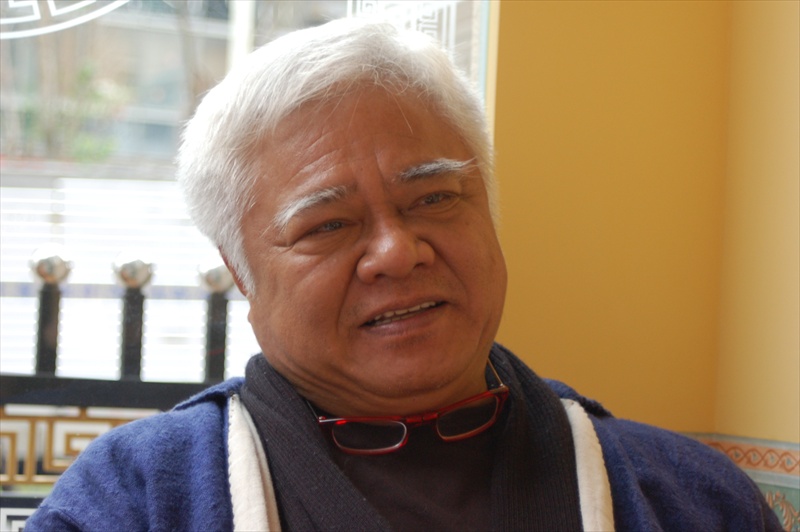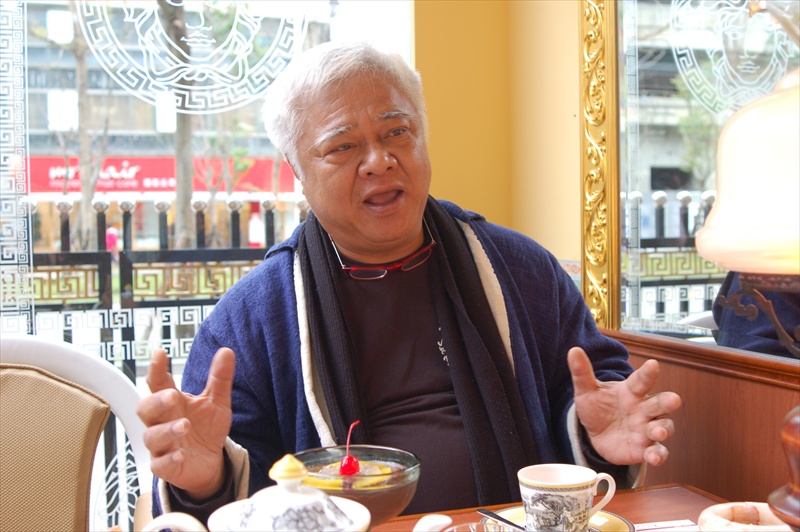Kimbo Hu: singer, activist and preserver of indigenous culture
Kimbo Hu is one of Taiwan’s most respected musicians although his style of music is far from the mainstream. It is a unique blend of elements of Taiwanese indigenous music and Western folk and blues. Although he has long been active on the music scene, Kimbo did not release his first album until well over the age of 50.
Kimbo’s life, just as his musical career, has had a number of twists and turns. He was born in Taitung County in 1950. His father is from the Puyuma tribe and his mother is from the Paiwan tribe. He lived in Paiwan villages as a child, but moved to the Taipei area at the age of 11. At his new school, the air of importance shown by a girl in the 6th grade while playing the piano during school assemblies caught his attention and sparked his interest in music. “I often went into the music classroom where she was practicing and asked her to teach me”, he says. The girl did teach him and so did one of the teachers. Together, it was enough to be able to play the assembly songs, which he did without being able to read sheet music.
Kimbo comes from a strong Christian background. This helped him to receive a full scholarship to Tamkang High School in Danshui from the Presbyterian Church. He explains that, “This was a traditional Christian school. From morning to night, there was always music and the school had a large choir.” However, Kimbo found himself caught between two loves: music and rugby. The school’s music teacher forced him to choose between the two and his love of sports won out. But, he notes that God provided leading in terms of music. He earned extra money by cleaning the piano rooms where he watched other students play and learned from them. He participated in quartets and studied gospel songs. These included American Southern spirituals to which Kimbo was naturally drawn as he felt that there were some similarities with indigenous music.
After graduating from high school, he attended the prestigious National Taiwan University enrolling in the foreign languages and literature department. Thus, he is able to converse in English. This skill has served him well as he has been invited to perform overseas, including in the U.S., and is able to explain his music and Taiwan’s indigenous culture to the delight of non Chinese-speaking audiences. His music career began in the 1970s as a singer of popular Western covers, such as “Today” and “Love Story”. But, he realized that singing cover songs was not enough. When people found out about his indigenous identity they asked him to sing indigenous songs. He was embarrassed that he didn’t know any. This prompted him to learn the songs of the Puyuma, as well as of the Paiwan, and even the Tsou and Amis tribes. Eventually he found that he could use the piano for songwriting. As it is difficult to arrange ancient indigenous ballads on the piano, the going has been slow and to date he has only completed 20 or 30 songs.Although his music career could have well taken off in the 1980s and made him rich and famous, he allowed his life to take another detour. It was at that time that an important study was released that showed that there were stark contrasts between the living conditions, income, education, etc. between the indigenous people and the mainstream Han Chinese people. Kimbo notes that one of the things that he is most grateful for in his life is the chance to come to the city and get a good education. Thus, it was reasonable for him to want to give back to society.
Thus, Kimbo became an activist and among the first to talk about reclaiming land from Han Chinese-owned businesses and from the government, preserving indigenous names and raising awareness of the issue of indigenous girls being forced into prostitution.
In 1996, his efforts and the efforts of other indigenous activists led to the establishment of the Council of Indigenous Peoples. He adds that, “Twenty years ago I participated in protests such as the dumping of nuclear waste on Orchid Island and the building of the Majia Reservoir, then I knew how to sing about them.” Thus, once again life came full circle back to his music. “The Longest Road”, written in 1983, is a song about indigenous peoples moving to the city to study or make a living. “Why?” was written in 1984 to commemorate indigenous miners killed in a mine explosion. “Flying Fish, Cloud Leopard, Taipei Basin” addresses the government’s building of a nuclear waste storage site on Orchid Island against the wishes of the indigenous Yami tribe. Other songs, such as “The Boy on the Buffalo's Back” and “Da Wu Mountain--My Mountain Ma-Ma” point to his longing for his home in Taitung County.These songs are included on his album “In a Flash” released in 2005 on the indigenous music label Ignite Fire. In 2006 he received 5 nominations at Taiwan's annual Golden Melody Awards for this album, winning Song of the Year and Best Lyrics. Now that his hair has turned gray, he is turning his attention to the preservation of indigenous music. “I want to be like the elders I remember from my childhood. They taught me not only from their songs, but also from their ‘ecology’, from their ‘spirit’. I want to be that kind of elder,” he explains.What he plans to do is to go back to Taitung to Puyuma villages to teach songs and to be a traditional indigenous person. “If I have the chance to go back to Taitung, I’m sure that more songs will come out,” he says. For his fans, that is good news indeed.

